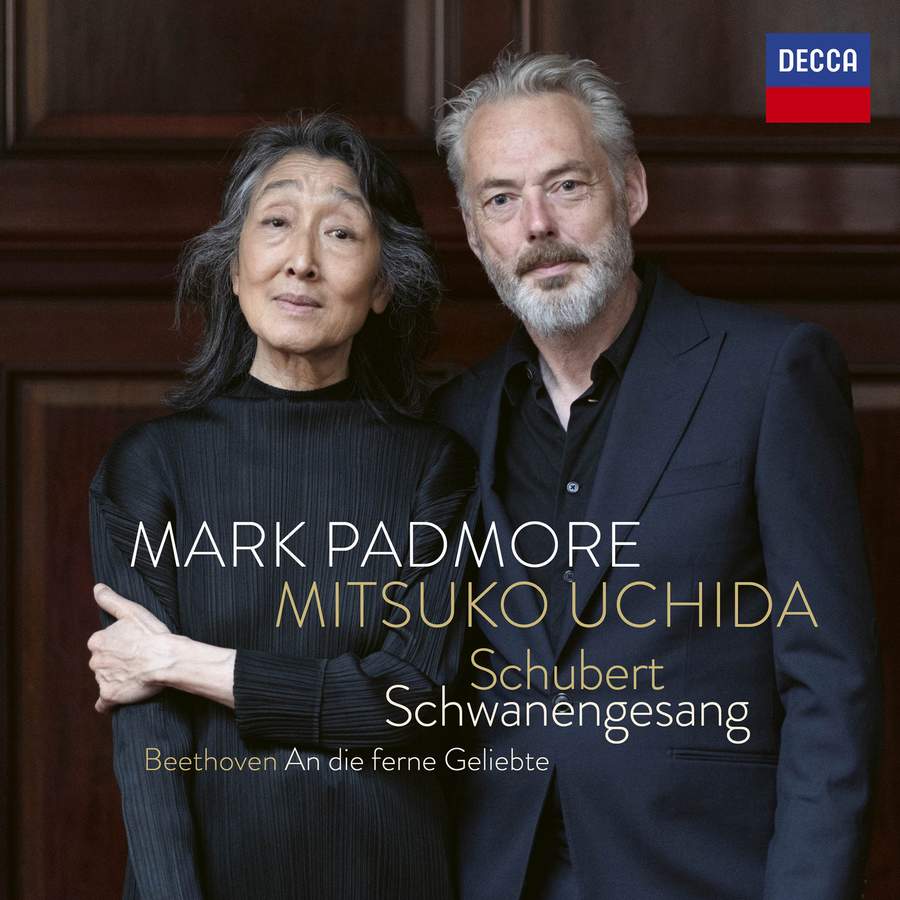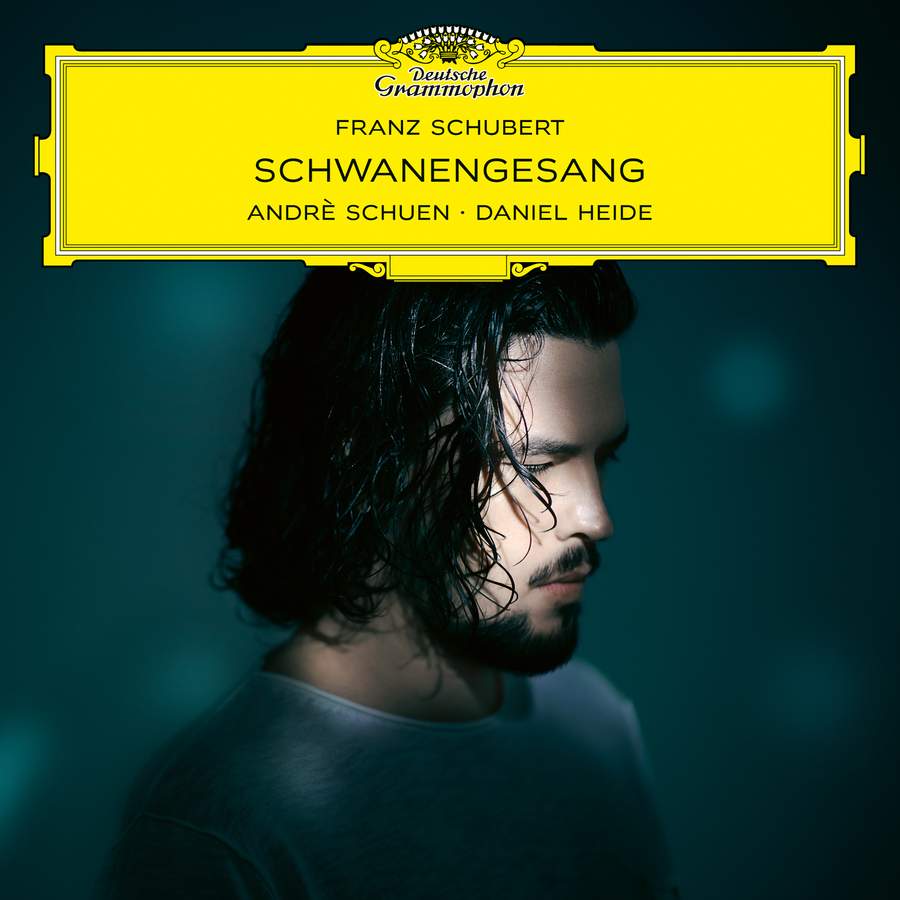SCHUBERT Schwanengesang (Mark Padmore. Andrè Schuen)
View record and artist detailsRecord and Artist Details
Genre:
Vocal
Label: Decca
Magazine Review Date: 02/2023
Media Format: CD or Download
Media Runtime: 71
Mastering:
DDD
Catalogue Number: 485 3577

Tracks:
| Composition | Artist Credit |
|---|---|
| Schwanengesang, 'Swan Song' |
Franz Schubert, Composer
Mark Padmore, Tenor Mitsiko Uchida, Piano |
| An die ferne Geliebte |
Ludwig van Beethoven, Composer
Mark Padmore, Tenor Mitsiko Uchida, Piano |
Genre:
Vocal
Label: Deutsche Grammophon
Magazine Review Date: 02/2023
Media Format: CD or Download
Media Runtime: 56
Mastering:
DDD
Catalogue Number: 486 3313

Tracks:
| Composition | Artist Credit |
|---|---|
| Schwanengesang, 'Swan Song' |
Franz Schubert, Composer
Andrè Schuen, Baritone Daniel Heide, Piano |
Author: David Patrick Stearns
Pairing Beethoven’s An die ferne Geliebte and Schubert’s Schwanengesang makes poetic and practical sense: though separated by only a dozen years, Beethoven represents the codification of the integrated song-cycle while Schubert represents a dissolution of sorts in a cycle united only by the poets at hand (Heine and Rellstab) and time of composition (the very end of Schubert’s life). The pairing isn’t unprecedented but makes a well-filled disc with the two composers complementing each other in the best ways, Beethoven with his purposely circumscribed harmonic palette and Schubert striking out in numerous directions to capture the hallucinatory, other-worldly qualities of the verse. However, in the two Schwanengesang albums under review, the one without Beethoven – sung by newcomer baritone Andrè Schuen – turns out to be the more complete experience.
Padmore and Uchida each have Schubert credentials that promise a historic meeting of musicians, and indeed there are moments of simultaneous brilliance. ‘Der Doppelgänger’, for one, has Uchida giving a telling shape to the spare piano-writing and Padmore conveying an epic emotional spectrum. But for the most part, the recording seems not to have captured qualities hailed by critics in the live performances in and around this May 2022 recording at Wigmore Hall – and also suffers in comparison with Padmore’s previous outings in this repertoire: the Beethoven in 2015 with Kristian Bezuidenhout (Harmonia Mundi, 5/15) and the Schubert in 2011 with Paul Lewis (A/11).
For starters, the recording’s sound picture – which seeks to integrate voice and piano – isn’t ideal for revealing details in either voice or piano. That’s not a drawback in Beethoven: Padmore’s unusually light, low-vibrato vocalism with volume and colour used sparingly and to good effect has a breathless, naive quality that works well with the ornate verse in the song-cycle, whose piano-writing forms a decorative but non-obtrusive frame around the vocal lines. But Schwanengesang’s more emphatic piano-writing sometimes covers Padmore, who again favours a light, confiding vocal manner. One obvious exception is ‘Der Atlas’, which turns to vocal bluster in place of his usual text-articulation magic. Overall, the voice isn’t as steady as usual. Padmore’s slender but unbreakable threads of vocal line and the shimmering colour of his high notes – so memorable in his collaboration with Lewis – are lacking here. The folksy, easy-going ‘Abschied’ unfolds at a somewhat relaxed tempo that leaves Padmore less able to sustain linguistic interest in strophe after strophe.
No such problems are evident with the Italian-Tyrolean baritone Andrè Schuen – an increasingly distinguished figure in the lieder world. Schwanengesang doesn’t fire his hardy interpretative imagination, as heard in his Die schöne Mullerin recording (DG, 5/21), and it should not. Attempts to impose a through line on this cycle have been disastrously reductive. Instead, one enjoys Schuen’s fresh, beautifully contoured baritone, deployed with breath control that allows him to sail into long vocal lines with an illuminating sense of long-term musical direction, plus telling articulation of text. Schuen also has a remarkable sotto voce in ‘Ihr Bild’, conveying the sorrowful incredulity of the song but with solid tone and none of the breathiness that is so easily fostered by the recording studio. Similarly, pianist Daniel Heide takes into account the whole picture of any given song, so that even the piano flourishes that suggest the hallucinatory qualities of ‘Die Stadt’ are part of the musical landscape rather than something out of left field. These are young interpretations, not replacing the great Schubert baritones (Dietrich Fischer-Dieskau or Matthias Goerne) but definitely warranting a place alongside them.
Discover the world's largest classical music catalogue with Presto Music.

Gramophone Digital Club
- Digital Edition
- Digital Archive
- Reviews Database
- Full website access
From £8.75 / month
Subscribe
Gramophone Full Club
- Print Edition
- Digital Edition
- Digital Archive
- Reviews Database
- Full website access
From £11.00 / month
Subscribe
If you are a library, university or other organisation that would be interested in an institutional subscription to Gramophone please click here for further information.




